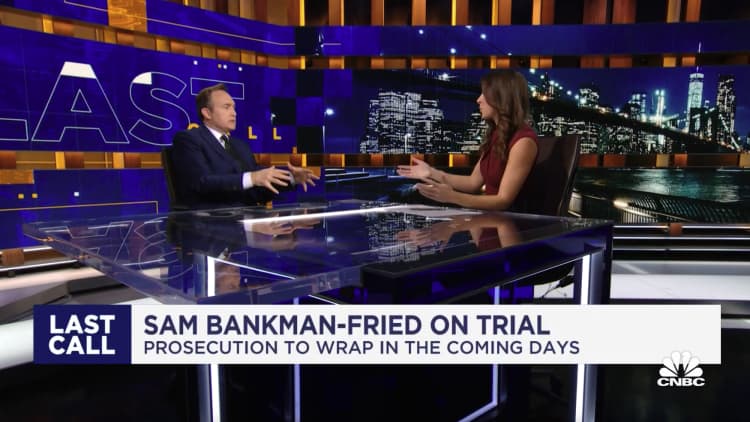A jury of twelve found FTX founder Sam Bankman-Fried guilty of all seven criminal charges brought against him. The question of how long he’ll remain in prison, however, is one that Judge Lewis Kaplan will spend the next few months deliberating by himself.
The no-nonsense 78-year-old judge is a veteran of the Southern District of New York and has presided over some of the biggest cases to roll through the courthouse at 500 Pearl Street in downtown Manhattan.
Kaplan is straightforward and has no patience for pageantry in his courtroom. If a witness is deliberately avoiding a question, or an attorney is being redundant and sloppy in his cross-examination, Judge Kaplan is quick to admonish the offender and set the conversation back on course. He also has no problem calling out members of the gallery for chewing gum in his courtroom.
The judge’s lack of patience with Bankman-Fried during the defendant’s four days on the stand was obvious to anyone who was there — or who later read the transcript.
The 31-year-old graduate of Massachusetts Institute of Technology was a sight to behold on the stand. Under direct examination, he would sometimes rush through convoluted, repetitive and contradictory sentences.
“So I should preface this by saying I’m not a lawyer,” Bankman-Fried began one answer.
“I’m not giving a legal interpretation of this. I’m just giving, as best I can, what my memory is. And the parts of this that jibe with that, I, you know — I’m not trying to give a definitive legal ruling on what this does or doesn’t say. The — I’m not sure that I would quite answer yes to the question as you most recently phrased it. I’m going to try as best I can to give the answer that I believe, which is that the — as — at least as I remember understanding it at the time, FTX either itself or I think as actually happened, without FTX as an intermediary, customers’ fiat funds would be sent to Alameda bank accounts, FTX would retain a — effectively a debt from Alameda for those and a — in the lien section here, a lien on Alameda’s assets as security for that ongoing liability, that it would be repayable on direction from FTX in the return section here, and — and in the payment directive section.”
Later, on cross-examination, Bankman-Fried suddenly clammed up, replying with “Yup,” and “I don’t recall,” hundreds of times. After several dozen of these instances, the government often presented evidence that would either directly refute the defendant’s testimony or offer an answer to the question Bankman-Fried had dodged.
Multiple litigators told CNBC that Bankman-Fried’s combative attitude toward Assistant U.S. attorney, Danielle Sassoon, wasn’t a good look for the jury or judge either.
So now, the question of prison time goes to Judge Kaplan. The sentencing date is March 28 at 9:30 a.m. ET.
Decades behind bars
Bankman-Fried was convicted of wire fraud and conspiracy to commit wire fraud against FTX customers and against Alameda Research lenders, conspiracy to commit securities fraud and conspiracy to commit commodities fraud against FTX investors, and conspiracy to commit money laundering.
That the jury was able to reach a unanimous verdict in a just few hours suggests that they were truly convinced and that there were no holdouts that needed to be coaxed, Yesha Yadav, law professor and Associate Dean at Vanderbilt University, told CNBC.
“This overwhelming consensus should give the judge confidence to follow the jury’s decisiveness by imposing a more severe sentence than a lighter one,” continued Yadav.
In this case, the statutory maximum sentence is around 115 years, but there is a sliding scale for sentencing according to recommended guidelines given the scale of the crimes and the criminal history of the defendant.
“I wouldn’t be surprised if SBF spends the next 20 or 25 years of his life in prison,” Renato Mariotti, a former prosecutor in the U.S. Justice Department’s Securities and Commodities Fraud Section, told CNBC.
“The sheer scale of his fraud was immense, he was defiant and lied on the witness stand, and Judge Kaplan had very little patience for his antics while out on bond. He will have more sympathy for the victims than he has for Bankman-Fried,” added Mariotti.
In August, Judge Kaplan revoked Bankman-Fried’s bail and sent him back to jail for witness tampering.
“The federal sentencing guidelines will likely be sky high, but they are just that — guidelines — and the judge is required to consider all of the circumstances surrounding SBF and his offense,” said Mariotti.
Yadav added that the issue of sentencing is governed by guidelines that look to factors such as how many have been harmed and the overall dollar quantum, as well as the seriousness of the damage a defendant has inflicted.
“Here, there are some factors that could push the judge toward a very lengthy prison term, possibly close to the 110 years that the sentencing guidelines suggest,” said Yadav.
The sentence will come down to what the judge believes is sufficient to punish Bankman-Fried, deter others, and promote respect for the law, he added.
Former Assistant U.S. Attorney Kevin J. O’Brien, who specializes in white-collar criminal defense in NYC, agreed, saying that, “Since judges have discretion even under the Guidelines, I believe his sentence will be in the 15 to 20 year range.”
O’Brien added that given Bankman Fried’s age, he thinks the judge will be inclined to give him a chance to live a full life after his prison term.
Bankman-Fried’s case has been compared with that of Elizabeth Holmes, founder of medical device company Theranos, which ceased operations in 2018.
Holmes, 39, was convicted in early 2022 on four counts of defrauding investors in Theranos after testifying in her own defense. She was sentenced to more than 11 years in prison, and began serving her punishment in May at a minimum-security facility in Bryan, Texas.
But former federal prosecutor Paul Tuchmann tells CNBC that he expects harsher terms for the former FTX CEO, because “the amount of losses that were suffered is simply staggering.”
Tuchmann compared Bankman-Fried’s case to that of Bernie Madoff, who was sentenced to 150 years in prison.
“Like Madoff, a lot of the losses in this case were small investors. They weren’t all large institutions, which really tends to create a greater pressure for a significant sentence,” said Tuchmann.
“Certainly, there may be some mitigation here. Sam Bankman-Fried is very young. The judge may take that into consideration. Bernie Madoff went to jail for 150 years when he was obviously much older – with limited productive years left,” Yadav said of the Madoff comparison.
“Sam Bankman-Fried still has an opportunity to make some kind of positive contribution during his lifetime. His crimes are also not violent in nature,” continued Yadav.
Another wild card is the fact that the Department of Justice may bring a second, entirely different case with separate charges against Bankman-Fried in Mar. 2024. The government has until Feb. 1 to let the court know if it plans to still proceed.
“A further issue here is that sentencing will take place in March 2024 – very close to the second criminal trial that Sam Bankman-Fried faces for campaign finance violations and bribery of foreign officials,” said Yadav. “The prosecution is likely to feel very confident going into this next trial. In other words, if he is also found guilty on these additional charges, he may see an even longer sentence potentially than the multiple decades worth of time (at least) that he is looking at presently.”

Read the full article here

